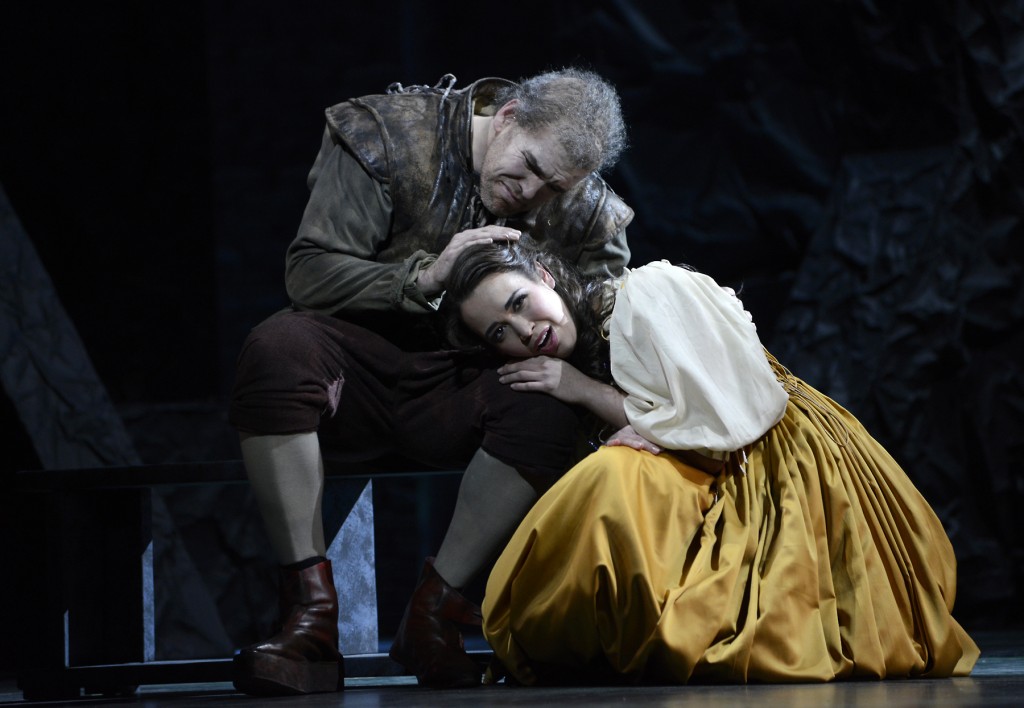
- Michael Mayes as Rigoletto and Nadine Sierra as Gilda; Photo by Eric Antoniou for Boston Lyric Opera
Presented by Boston Lyric Opera Music by Giuseppe Verdi
Libretto by Francesco Maria Piave
Directed by Tomer Zvulun
Conducted by Christopher Franklin
March 14 – 23, 2014
Shubert Theatre Boston, MA
BLO on Facebook
Sung in Italian with projected supertitles in English. Performed in 2 “acts” with 1 intermission.
Review by Kitty Drexel
(Boston) The vocals of BLO’s Rigoletto are simply stunning. In particular, Michael Mayes as the title character and Nadine Sierra (Gilda) were a treasure to hear and watch. Audrey Babcock (Maddalena) smolders! This vocals of the male chorus were powerful but difficult to watch. It appears that they can only emote when given specific direction to do so. The sumptuous costumes by Victoria Tzykun mostly made up for this. Conductor Christopher Franklin leads his orchestra with admirable humility and confidence. His reverence for Verdi is evident from his first step into the pit.
Rigoletto is about a pitiful hunchbacked jester named Rigoletto. He works for the debauched Duke of Mantua. Rigoletto’s only source of joy is his daughter Gilda who inevitably gets kidnapped by the Duke. By treating Rigoletto as a man, Verdi’s opera is revolutionary. Before the 1850’s, the physically disabled and mentally unhealthy were often piled together in rank “hospitals” and treated like animals. At the time Rigoletto was first debuted, these hospitals were receiving the reform they desperately needed. The disabled were recognized as beings deserving of respect.
One of the most positive aspects of Verdi’s opera is that Rigoletto is treated like a fully realized human being. He gets a range of emotions and speaks his mind on a number of subjects. Whereas the fully-abled men around him are beasts whose acts of villainy know no bounds. Given this, it is with a sad heart that I chastise this production. Director Tomer Zvulun uses Rigoletto’s hunch and walking impairment as a metaphor for Rigoletto’s fall into depravity. Rigoletto starts the show with no impairments but, by curtain fall, his hunch is so large that he cannot fit into his jacket and his leg is crippled. We, the members of the disabled community, are people. Our disabilities are not an effect to put on or take off for artistic purposes. We deserve the same respect that your abled patrons receive. To use Rigoletto’s disability in this manner is unconscionable.
While pleased with the onstage performances in BLO’s production, I am deeply dissatisfied with my experiences in the house. I sat next to a polite woman who made the unfortunate decision to attend the opera while being Black. Let’s call her “Lovely.” Lovely was led to her seat by an usher moments after I sat down and was patiently reading her programme. Lovely was the only POC in my section of the audience unaccompanied by a White person. Minutes before the show started, an usher came to check if she was sitting in the correct seat. While it was a decent audience for a Sunday matinée, empty seats peppered the mostly full Orchestra section. There were no confused patrons waiting in the aisle. It was calm. Lovely’s ticket was checked by the middle-aged usher because the usher didn’t believe that Lovely could afford a ticket in the orchestra. This, ladies and gents, is an example of systematic oppression. To assume that a POC can’t afford a nice ticket to the opera is racist. For an institution desperately seeking to appeal a wider, younger audience, this is a terrible way to do it.
There is a lot to admire about Rigoletto. Please do attend but be aware of what you are experiencing and the experiences of those around you.
